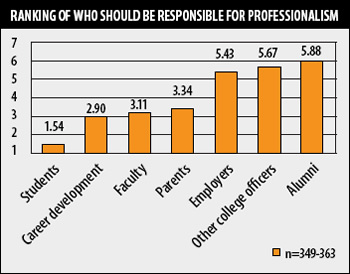Career Services: The Times, They Are A-Changin'

PHOTO COURTESY OF LES ROCHES
A recent survey of college and university career development offices by the York College of Pennsylvania’s Center for Professional Excellence revealed that 66.3 percent of respondents increased their focus on professionalism over the past three years. Also telling of a new era, 41.1 percent of career development offices have undergone name changes in recent years to better explain the relationship the office hopes, and expects, to have with students.
“To me, ‘career services’ just doesn’t say what you’re actually doing. It’s so vague it’s a non-starter,” says John Thompson, director of the previously named Career Services office at Texas Christian University (TCU) in Fort Worth. On June 1, John’s office evolved into the Center for Career and Professional Development. “Professional development better illustrates the end goal of our office. It also sends a message to our alumni that we’re not just here to provide career advice. Our approach is going to start a real plan, so when a student graduates, they don’t remember the career center as just a place they filled out a résumé.”
Changes to Thompson’s office are not just skin deep. The name change is simply the first of several initiatives he plans to accomplish over the next several years. Career Vision 2017 includes 10 specific goals to increase interaction between students, alumni and the career development office. Among those proposed changes is creation of a for-credit course to ensure students walk through the door.
“Students don’t know they need you until they need you. We can’t wait for students to come to us because they’re typically not going to do it. There has to be an incentive to do it and the best incentive is to make it mandatory. If I can get the course, then I’ve got them hooked and they’ll understand the important role we can play in helping them,” Thompson says.
Collaborating Across and Beyond Campus
One change at Virginia’s Roanoke College is that Toni McLawhorn’s Career Services office has taken a more proactive approach to reach students, instead of waiting for them to come to her. Toni’s office now seeks collaboration opportunities through student organizations and groups as well as faculty to incorporate career development deeper into the syllabi.
In 2013, Mansfield University in Mansfield, PA, spearheaded an initiative with five other Pennsylvania institutions to develop the Senior Transitions Conference. The two-day professional conference provides graduating seniors with skills that aren’t covered in the curriculum, but are still vital to navigate the jump from college to career. Topics include an etiquette dinner, effective networking, negotiating a job offer, using social media to your advantage and others.
“It’s a fairly regular occurrence to hear from employers that some college graduates, while prepared to enter their field of study, are not necessarily as prepared for the overall demands of working in teams, managing different personalities, and presenting themselves as competent professionals,” says Nichole Lefelhoc, director of the Career Center at Mansfield. “Changes are necessary because young professionals need to be able to compete and interact with more seasoned professionals in a workplace environment, and those skills aren’t necessarily taught in the classroom.”
Changes are coming to Lebanon Valley College in Annville, PA, as well, where this fall, Career Services will become the Center for Career Development, and the department will be relocated to a newly renovated area within the Student Learning Commons to increase visibility.
“New technology and private space for employers to conduct on-campus interviews within the suite are two of several visible upgrades that demonstrate the college’s commitment to the unique and complementary role that we play in the overall education for students,” says Director Sharon Givler.
Professional Expectations
Debra DelBelso, director of the Career Center at Siena College in Loudonville, NY, noted that a name change is in the works for her office as well, and is expected to launch within the next year. Her career counselors have begun presenting to classes about workplace etiquette, time management and proper cell phone and computer use that recent graduates can sometimes fall victim to.
“Most college students have not learned how to conduct themselves in a professional work environment prior to attending a higher education institution. The central mission of the career development office should address educating students for a lifetime career and not only the first job they land straight out of college,” says DelBelso.
At Meredith College in Raleigh, NC, the offices of academic advising, academic support, cooperative education and career services were rolled together to create Academic and Career Planning. The creation of “Take A Student to Work Day” through collaboration with alumnae relations allows students to shadow a workplace environment to observe board, staff and client meetings and training without the pressure of losing a job due to a workplace faux pas.
“Communication skills and other soft skills have always been important to prospective employers,” says Marie Sumerel, director of Academic and Career Planning for Meredith College. “The ever-changing workplace requires workers to be adaptable and agile in order to respond. Employers provide continuous training as their environment and workload changes. The academy must adapt to the changing needs of the work world because outcomes have always been an important element of how career centers are evaluated.”
Albright College in Reading, PA, now offers an event with a familiar acronym for college seniors, but illustrates the need for a new meaning behind it. “BYOB” at Albright now translates to students to “Bring Your Own Briefcase,” where seniors learn about dining etiquette, proper interview and office attire, and listen to discussion of professionalism and what will be expected of them after college. Karen Evans, director of Career Development in their recently formed Experiential Learning and Career Development Center, notes that she is also plugged in to employers who interview students on campus to understand where students performed well, and where they had room to improve.

Accepting Responsibility
Common questions swirl about who bears the brunt of the responsibility to ensure students are prepared for the workforce upon graduation. When ranking seven entities on a scale of 1 to 7, with 1 being most responsible, 70.5 percent of respondents named students first. Following students, respondents put the onus on themselves next, ahead of faculty, parents and employers (see chart on page 48).
For Thompson at TCU, however, finger pointing is counterproductive and ultimately irrelevant to the outcome students have.
“Employers tell us a lot that students overall are just not prepared [for] life after college, and the tough question is ‘Who’s responsible for that?’ Is it the students? Should it be the parents’ job? [The] university’s job? I don’t really care whose job it is. Anything I can do to make it easier on the employers who rely on us to provide them with good students, I’m going to do it. It keeps employers coming back to us and simultaneously helps the students be prepared for a long, successful career,” says Thompson.
This article originally appeared in the issue of .